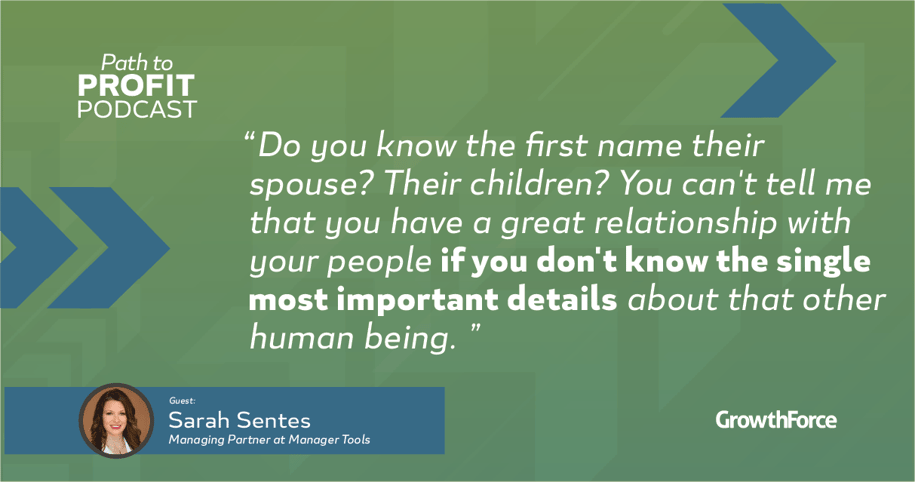8 min read

"All of the folks who ever report for us . . . they've all worked for someone before us, and let's face it. There are a lot more bad managers out there than good ones."
|
Key Takeaways
|
According to Sarah Sentes, managing partner at Manager Tools, this means, "people come with baggage. People come with an expectation of leaders, [of] managers, [that] is not always positive."
Managers – whether they are just managers or have ascended to become people leaders in their organizations – face the challenge of managing and motivating people (people who likely haven't had the best managers in the past) every day.
GrowthForce founder and CEO Stephen King discussed strategies for, not just successful management, but successful leadership, as well, with business leadership and management expert, Sarah Sentes, in the latest episode of Path to Profit.
🎧 Looking for more leadership and business sound bites?
Listen to the full episode (& many more) here!
Management vs. Leadership: What's the Meaningful Difference?
To become a better manager, it's essential first to understand the defining factor between good management and poor management, and that defining factor is leadership. The difference between a manager and a people leader is, of course, the ability to lead. But what does this mean exactly?
The following definitions outline the difference between a manager and a people leader, according to Sentes.
- Management Definition - Managers include anyone whose professional roles and responsibilities have any sort of leadership quality. Managers are the individuals who are mostly concerned with checking boxes and making sure goals are met and jobs are done.
- People Leader Definition - A people leader, while still responsible for their managerial duties, concerns themselves more with using people management skills to become effective leaders who are able to inspire and motivate their directs while also ensuring the nuts and bolts of the work are handled effectively.
Effective Leadership Grows From Trusting Relationships
As Sentes explained, the mission of Manager Tools is to help all people leaders to become true leaders – not just managers. The primary way that an individual in management can foster their leadership skills is by focusing on their people skills by building relationships with their directs. Sentes said, "We're trying to help managers build trusting relationships, rather than have a role [and] power-based managerial style which is not the most successful way of leading people."
According to Sentes, good leadership in management is based on trusting relationships. King agreed, saying that when you think about your best boss ever, "it's always going to be somebody who cared about you and your success."
If people skills don't come naturally to a manager, then building relationships with the people they're managing can be a challenge. Sentes and Management Tools have created a suite of tools to help managers become leaders through relationship building.
How to Become a People Leader by Building Relationships (5 Steps)
1. Everything Starts With Communication
According to Sentes, "If you say something seven times, half of the people on your team will report having heard it once."
Communication is essential in all aspects of management and leadership. Clear, consistent, and repeated communication is necessary for building relationships with the individuals on your team, and it is also vital to the clear transmission and execution of your business's mission statement.
"As the overall leader of your organization, CEO," said Sentes, "you are responsible for the results and retention of your organization, ultimately. So, [communicating the message] is part of it, talking to people...It's also transmitting those messages clearly to the folks on your team so your directors or your managers . . . can communicate those messages clearly to the individuals on their team[s]. Every manager within the organization speaks for the organization itself ... You're not a lone wolf out there."
Read More: 11 Best Podcasts for Small Business Owners and CEO's
In order for a business leader to have a future vision and then make it a reality, they need to be able to communicate that vision (in addition to the goals and benchmarks that are necessary for its achievement) to their team of managers, so that the managers can then effectively communicate the same ideas to the people working directly beneath them and so on and so on until the communication has reached the bottom of the organization chart.
Business communication, especially in organizations where hundreds or even thousands of people are working, is like a giant game of telephone where opportunities for misunderstanding and miscommunication exist between every tier in the org chart.
2. Learn What Motivates Your People
A primary aspect of effective communication is scheduling regular, weekly, one-on-one meetings between managers and their team members. While these meetings are useful tools for managing day-to-day business and keeping tabs on progress or other work-related topics, they are also a good opportunity for building relationships. Sentes emphasized the importance of using weekly meeting time to get to know employees.
"Let the directs talk first," she recommended. "Meet to discuss what's most important to each of the parties in that interaction."
Listen to the full episode HERE! 🎧
She explained that if family, friends, hobbies, vacations, and personal lives are the things that are most important to your employee, then – instead of always meeting to follow up on their work status – you should prioritize taking the time to learn about the things that are important to the employee and give your employee the time and opportunity to share those things with you.
By getting to know your employees as individuals, you will be better able to manage them because you'll understand their priorities and connect with them on a deeper level as human beings. This kind of relationship helps to foster trust, transforming your manager-employee team into a partnership where managers have the opportunity to help lead their team members to personal and organizational success.
3. Personalize the Business Mission Statement to Speak to the Individual
"As the leader of an organization," said Sentes, "you should sit down with every person within your organization and talk to them about who they are and what their personal career goals are. Talk to them about your mission and what about your mission speaks [to them]."
Messaging is only really heard, understood, and held onto when it holds some value for the listener. Sentes provided an example of mattress advertisements, explaining that if you are shopping for a new mattress, then you start to see mattress ads everywhere – and you pay attention to them. You might even search them out on your own. Mattresses are all you talk about with anyone when you need a new mattress. If you don't need a new mattress, all of those messages and conversations suddenly lose their value. You no longer pay attention to the ads. You no longer ask your friends about their mattresses.
Business mission statements have the same potential to gain or lose value depending on how relevant they are to the person being told about the mission statement.
For this reason, it's important to understand the individuals in your company so that you can help them find their own value in your mission statement. When managers know their team members, they can work with them to create their own version of the business's mission that helps motivate them (in the same direction as the business's future vision) from their own perspective and unique goals.
Read More: Micromanagement May Be Destroying Your Business
4. Know Their Aspirations
Managers become leaders when they care about their direct future (i.e. the future the manager could help lead them to). So, it's important to talk with your team members about their aspirations and goals. While you might not want a great employee to advance in the company and off of your team, failing to help them develop their careers could result in them becoming disengaged in work and leaving the organization altogether.

5. Be Aware of Your Own Biases
Everyone – including all managers and leaders – has inherent biases, Sentes explained. As humans, there's simply no way around it. For example, a manager who is also a parent is naturally going to connect more easily with an employee who also has children of a similar age. Someone who's more outgoing and assertive will be easier to connect with in the breakroom than an employee who happens to be quieter and more reserved.
As a result, managers develop trusting relationships with these employees more quickly than they do with others. Despite this, it is the responsibility of a manager who aspires to be a successful leader to seek out connections with the individuals with whom they have less in common.
It is also important to recognize and manage the fact that, when you connect easily with an employee, you might have a bias toward that employee when it comes to promotion recommendations or other opportunities. These biases can operate either way in favor of or against the employee. For example, you might want them to succeed because you know they could use a raise to help with the cost of raising a family or you don't want them to advance because you'll miss their companionship.
Focus on Communication to Become a Better Business Leader
At the end of the day, the difference between managers and people leaders boils down to relationships, and relationships come down to communication. If managers can focus on communicating and connecting with their team members on a one-on-one basis, they'll naturally help to foster positive workplaces that are filled with support, opportunities, and safety that are all developed through trust.



